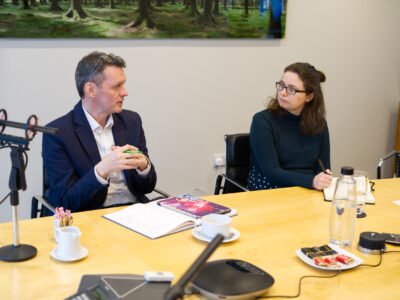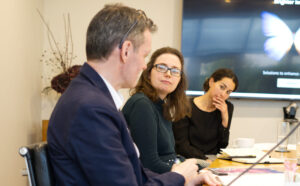Introduction
Over recent years, the field of sustainability has seen ever more division and lack of consistency in views and approach. Given a lot of this rhetoric revolves around vested interests, Aurum Funds Limited convened an ESG roundtable to cut through the noise and uncover the key issues that need to be explored.
Emily Forsyth-Davies Head of ESG at Aurum Research Limited moderated a diverse panel of experts in discussing a wide range of critical sustainability topics. Their collective expertise enabled a fruitful exchange, highlighting common ground and differences to narrow the gap between varying perspectives.
The participants tackled a broad range of questions about the biggest sustainability challenges faced globally. They also discussed practical topics around ESG framework development and corporate disclosures. Discussions culminated on how to ensure a future healthy planet for all.
There were common themes across all these topics around policy lagging the corporate world, the interconnected nature of all living and non-living things, and how fragile the current global world order is. It was also noted how data is becoming increasingly important and how AI can be used to benefit society.
Contents
- Participants
- The biggest sustainability challenges over the next 5 to 10 years
- Company disclosures, where they are beneficial and where they can improve
- Unintended competition of climate reporting, climate views, versus biodiversity
- Interconnected risks and global tipping points
- Using AI to solve sustainability challenges
- Significant policy changes needed for the green transition
- Carbon credits are they a distraction or do they have a role to play
- Hopes for a future healthy planet to restore equilibrium
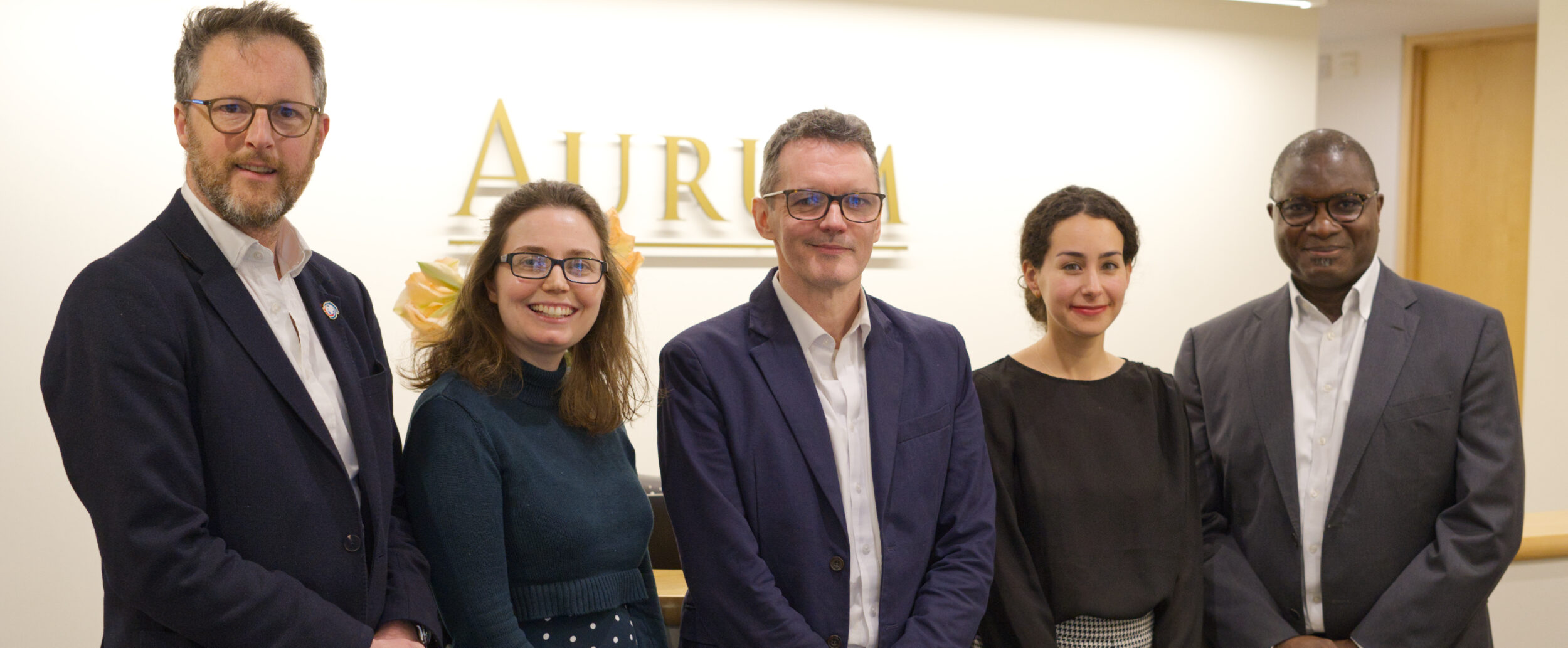
Moderator

Participants
Prior to Acumen, Lindsay served in the US House of Representatives as a congressional aide. She has also worked in Australia and Japan, working with asylum seekers and teaching English. She holds a master’s degree in Social Business & Entrepreneurship from the London School of Economics & Political Science and a bachelor’s degree from Miami University.

Lindsay Camacho
 Government Partnerships Manager
Government Partnerships Manager
Acumen
 Aled Jones
Aled Jones
 Director
Director
Global Sustainability Institute


 Chip Cunliffe
Chip Cunliffe
 Programme and Risk Director
Programme and Risk Director
Ocean Risk and Resilience Action Alliance (ORRAA)
 Emlyn Ade Palmer
Emlyn Ade Palmer
 Head of Sustainable Investing
Head of Sustainable Investing
Albourne Partners

What are the biggest sustainability challenges we are facing over the next five to ten years?
A deliberately high-level opening question to kick-start discussion and begin to ascertain commonalities and differences between the participants’ views.
“The biggest thing that will define the next five to ten years is change.”
Aled JonesAled Jones
The biggest thing that will define the next five to ten years is change. We are at a tipping point within the finance sector around understanding and implementing actions, in particular on climate change, and then other things in ESG will follow behind. For example, with TCFD, the task force around disclosure frameworks that is putting more data out in the market. However, not very many people are doing anything with that data currently. But then with all the finance that is being promised to flow, and we’ve been talking about it for 30 years, it does seem like solutions involving innovation, infrastructure, are all starting to scale up.
For example, in recent years, this has already created brand new industries, such as electric vehicles, renewable technology, big energy infrastructure projects – the start of huge exponential growth.
“Companies are changing – transitioning from a very shareholder-focused world to one that’s more focused on stakeholders.”
Lindsay CamachoLindsay Camacho
We’re at this inflection point of the transition where companies are changing – transitioning from a very shareholder-focused world to one that’s more focused on stakeholders. For example, companies are reincorporating as benefit corporations and community interest corporations, and thinking about how they can go beyond just sharing wealth with their employees, but also their supply chains and communities. We’re seeing investors being a lot more thoughtful about social and environmental metrics, and giving the same scrutiny and rigour that they do to financial sustainability metrics, which is exciting to see. We are also in the midst of an unprecedented, intergenerational transfer of wealth, which is going to women and millennials who are more focused on the impact of their investments, and we can expect to see the impact investing industry continue to grow from its current $1 trillion.
Chip Cunliffe
The finance industry is really starting to drive change. The private sector is able to contribute to change quicker than governments as they get less bogged down and can drive sectoral advancement in utilising their skills, their understanding and indeed their balance sheets to drive change.
Given 2030 is the date that many of us are very much focused on, there’s a real need for us to drive forward more quickly than we’re currently projecting. The private sector can help to do that. I think governments are probably falling slightly behind, but it’s really positive that they are supporting the Task Force for Nature-related Financial Disclosures (TNFD), the Task Force for Climate-related Financial Disclosures (TCFD), etc as these will help to focus the mind as there’s a lack of understanding from a financial literacy perspective.
Emlyn Ade Palmer
I believe the world is going to look quite different in five years’ time. One of the big changes will be political as half of the world’s population will be voting in new leaders over the next year. Policy almost always lags the edge of economic activity because of this sort of transmission effect that gives rise to legislation and regulation. Originally the focus with sustainability was risk, but over time the opportunities that these structural changes bring are coming to the forefront.
What company disclosures do you see as most beneficial and which areas are most lacking?
Do you think the enhancements to company disclosures are helping to evolve the sustainability conversation? Or do you think people just see them as, we’ll do the reporting and then we won’t do anything further?
Lindsay Camacho
It’s helping. We face the same issue in the impact investing industry where everybody talks about impact, and shares impact reports that are not actually that impactful. What’s exciting me is that there are a crop of providers that are springing up to provide these services. We work with a company who are building out their corporate offering to say to corporates that have supply chains in the Global South, “Hey, we can help benchmark for you whether or not you’re providing a living wage to people in your supply chain. And you can then, as a result of us undertaking this data for you, see how you’re stacking up against your competitors.”
We’re starting to see some innovation in reporting, but need to continue to push each other to be more thoughtful about how we actually hold everyone to a standard of measuring outcomes because outputs are not impact.
Aled Jones
To share a very cynical view of the world. I think it’s really interesting to look at the things like gender pay gaps, but also living wage, and the issue around the social part of ESG, but then also climate biodiversity and the impact we’re having.
A lot of the reporting leads to tweaking the structure. So, for example, we see companies start putting in living wages. Although, we are not really addressing that fundamental underlying economic problem that the economy is set up to exploit people to accumulate wealth and capital into smaller and smaller pockets.
The world’s now at higher inequality levels than it has been since the second world war. The only way this has been resolved in the past was by dramatic redistribution of wealth because suddenly people were coming back from fighting in the war and saying this isn’t good enough. I hope it’s not going to go to take another global war to start this redistribution. But I’m not sure disclosure from corporates is going to be a good substitute for a global war. But I don’t know what else is. That might be too pessimistic a view.
“It may well be that social media, further improves awareness of developments and issues which were more easily suppressed in the past.”
Emlyn Ade PalmerEmlyn Ade Palmer
The one thing which might also serve as the catalyst for a sense of things not being good enough might be the way information flows around the world now. It may well be that social media, further improves awareness of developments and issues which were more easily suppressed in the past.
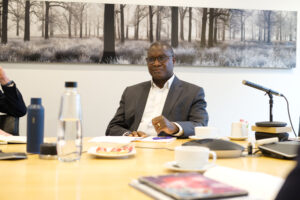
Do we think that there’s a risk between the competition of climate reporting, climate views, versus biodiversity?
Do we think there’s a risk that that could detract from the overall aims or do we see them as beneficial and symbiotic to each other?
“TNFD is not going far enough for the oceans – only really dipping a toe in.”
Chip CunliffeChip Cunliffe
TNFD is not going far enough for the Oceans – only really dipping a toe in. This is driven by the lack of financial literacy and about its importance of the ocean being healthy for all of us. Everything from the oxygen we breathe to the food security that we require in the Global North and the Global South – all depends on healthy oceans. It is also essential for those ecosystems that provide the resilience benefits to all those people who live in and around the Ocean to thrive.
Emlyn Ade Palmer
It’s positive that TCFD and TNFD have been designed to be both symbiotic and useful in different ways. However, there has mention of stakeholder gaps in the creation of TNFD and it would seem that there is a need for it to cover a wider range of areas than it does in its current form.
One of the things challenges with this is motivating people to take action to deal with it within their spheres of influence. In the context of a financial value chains, outlining the financial implications of biodiversity or the lack of it could help motivate investors to act on it.
Aled Jones
Even within COP, we have a very transactional and asset-based view of the world. And the ocean is nobody’s asset. So that’s why it has been overlooked for so long.
There will be an increasing amount of data and acknowledgement that nature is an issue that companies should be considering. Although it seems to be much slower than TCFD.
We can’t measure everything. And so to understand the world and how it works and the system, we have to get better at using qualitative data, understanding qualitative scenarios, qualitative data to make decisions. And then what we need to do to improve climate and biodiversity outcomes, not our financial metrics that are linked to those.
“A lot of the frameworks are really focused on activities and outputs and not outcomes.”
Lindsay CamachoLindsay Camacho
A lot of the frameworks are really focused on activities and outputs and not outcomes. By changing the approach to have a “more qualitative narrative style of reporting” that, for example, is not solely how many jobs were created, but actually looks at how many households now have a living wage and are more resilient to financial shocks or climate change. This standardisation would help to prevent things like greenwashing and pinkwashing.
There are a number of interconnected risks and global tipping points that are near to being reached. What do you view as the key risks we are facing in the near to medium term?
More broadly what do you view as the most likely apocalyptic scenario and are we close to this than we think?
Lindsay Camacho
For me this is forced displacement, which we’re already seeing. The World Bank has quoted that, due to climate change alone, there’s an expectation that between 250 million to a billion people will be displaced by 2050. For any companies operating in the Global South there needs to be a focus on building resilience in the communities where they are based to anticipate supply chain and business interruptions. Companies can also do more to consider how they can offer employment to displaced people to support their self-reliance. There is some good research being spearheaded by the Refugee Investment Network about this idea of the “refugee alpha”, which demonstrates that within a corporate context refugees are actually very loyal employees who stay with companies significantly longer than local employees.
Emlyn Ade Palmer
More broadly, one possible apocalyptic scenario centres around the Global South, specifically Sub-Saharan Africa which is where I’m from. Specifically in relation to power generation, industrial infrastructure, transport infrastructure and transportation and so on. The apocalyptic scenario is one where the development of renewables power infrastructure in the region continues to stall whilst fossil fuels becomes a niche resource and expensive resource globally, resulting in a massive negative impact on quality of life in the region, and that is even before considering the potentially disproportionate effects of climate change on the people living there. Depending on how quickly Energy Transition ambitions are realised in global terms, this could potentially crystalise in the medium term.
Chip Cunliffe
Food security is a key area alongside the implications of climate change, as has been spoken about in the Global South. One of the projects we are supporting with our partners, Rare, is around linking insurance or microinsurance for fisher folk in the Philippines. The aim of this insurance is to provide a supplementary payout when the sea is too rough for fishing. The reasons for this are threefold. Number one, to ensure they don’t put themselves and their own lives at risk and indeed the livelihoods of their family. Number two, after the storm has passed through, they don’t use destructive fishing practices, like dynamite, to over fish and and make up their losses. But number three, is also incentivise them to continue living in their traditional communities and not to migrate to the cities, keeping their community together with security over their future ability to fish.
“We’ve also started something called the Global Chaos Map, which is just to count the number of deaths that are related to food, energy or water issues.”
Aled JonesAled Jones
So, when we undertook some work around what would actually be required to create an apocalypse in the Global North we were really surprised at how easy it was to do. The biggest risk isn’t understanding the actual physical risks, it’s understanding how the market responds. It’s when India puts on a trade restriction because they’re worried, and then suddenly prices start to go up. In 2007/2008, prices went up by factor of five. Across Sub-Saharan Africa, North Africa and into the Middle East, you had people saying we can’t afford food anymore who then go out and protest which often escalated into the government launching a crackdown, and then governments collapsing. We’ve also started something called the Global Chaos Map, which is just to count the number of deaths that are related to food, energy or water issues. There are quite a lot, and not just in the places that people expect, we’ve got many linked deaths in France, in Spain and Australia.
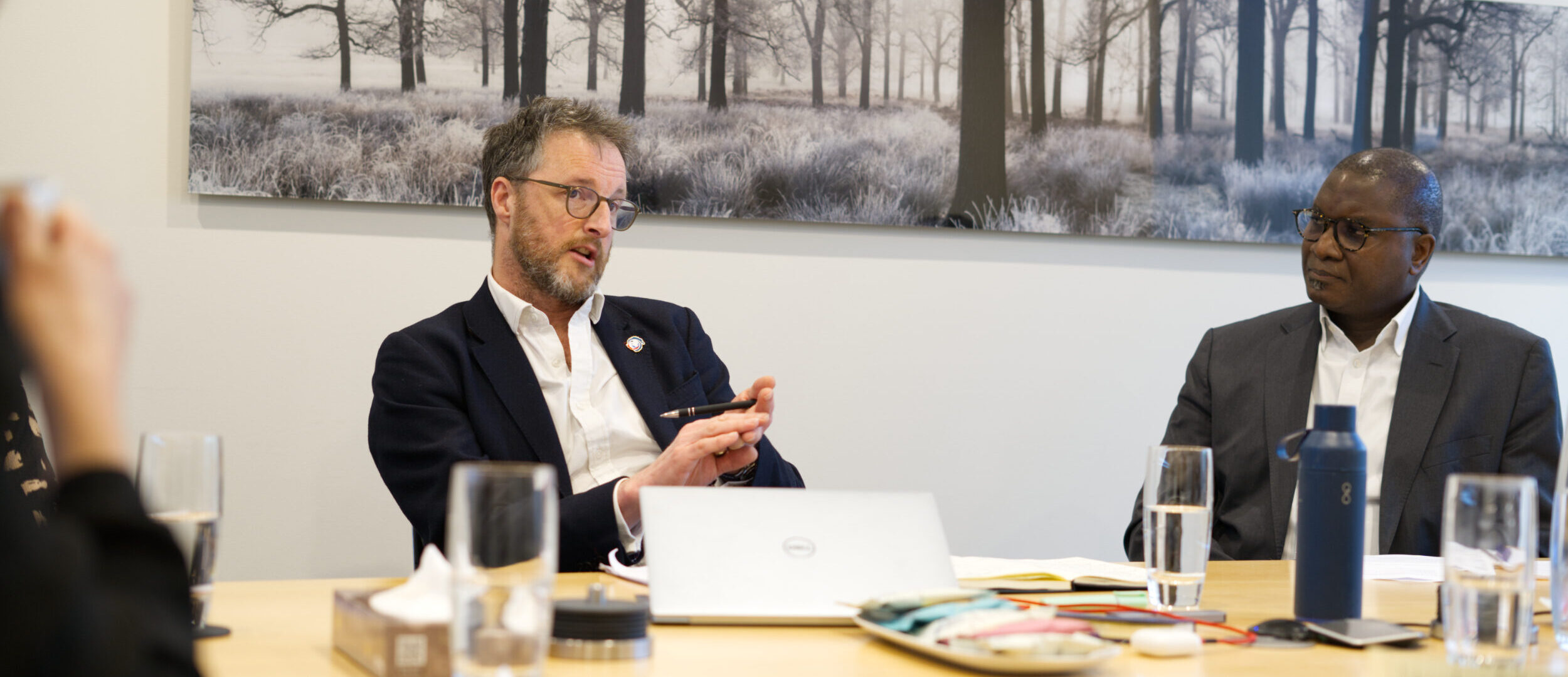
Is there a fundamental issue, in your view, of using AI to solve sustainability challenges? And what’s your perception of using it for that in particular?
A key criticism of AI is the over representation of data sets based on Global North, where most internet users are based, and people of the Global South are being overlooked in the development of large language models and neural networks.
“Responsible AI is the process of really looking at how AI is actually used and the effect that it’s having on society, making sure it’s not divisive or damaging, that it’s doing what it’s supposed to do.”
Emlyn Ade PalmerEmlyn Ade Palmer
Someone wrote that “AI should really be about sculpting the technology landscape to suit the contours of human need and market demand.” There is a question of how these models are created, how the data sets are compiled, how models are trained, how they’re evaluated for efficacy. There is this thing called responsible AI and it is about trying to address some of the ill effects that could result from poor development and implementation of AI. Responsible AI is the process of really looking at how AI is actually used and the effect that it’s having on society, making sure it’s not divisive or damaging, that it’s doing what it’s supposed to do.
Lindsay Camacho
We’re certainly seeing greater operational efficiencies based on the use of AI. There are companies that are leveraging it, certainly, on the data side. But I think the question we just have to ask is where is the input coming from and who is feeding into it? Kind of going back to your original question.
Chip Cunliffe
I can see that the use of AI in modelling, will be useful. But, it comes back to Lindsay’s point around where the data comes from and how it’s fed in and how it’s manipulated. There is a lot more that we need to understand to be able to utilise it effectively.
“The key thing with AI is rubbish in rubbish out. We’re training AI on a society we know doesn’t work, which is unlikely to solve any problems. It doesn’t learn how to do things better because it doesn’t know how we’re going to respond to it.”
Aled JonesAled Jones
I totally agree with what Emlyn was saying, we do quite a lot of work around looking at how knowledge is used for decision-making, mostly within governments but also within companies.
We’ve been doing quite a bit of work for the UK government around energy models and how that is used, especially to look at innovation. So that project has just ended.
The key thing with AI is rubbish in rubbish out. We’re training AI on a society we know doesn’t work, which is unlikely to solve any problems. It doesn’t learn how to do things better because it doesn’t know how we’re going to respond to it.
You don’t need AI to make those decisions, you need people who can engage and think. So yes, I think there is a big rush, which is a risk and we need to slow it down. So the EU is right to try and slow it down because otherwise we’re just going to cement in even more an economy that doesn’t really work and doesn’t give us the outputs that we want.
What are the most significant policy changes that need to be seen to ensure a smooth transition?
It’s deliberately a very broad question, but what would you, personally, really like to see over the next 10-year time horizon and what do you think will be a real problem if you don’t see it? And this can be on a UK level, a global level, it can also be the interrelations between governments.
“Dare I say, there’s an ocean of opportunity?”
Chip CunliffeChip Cunliffe
Dare I say, there’s an ocean of opportunity? I mean it is a big space and you’re right, we are or it is lagging behind. And I think I go back to that piece around financial and ocean literacy, and having that integrated into decision-making processes.
I think that the world is very much focused on the terrestrial and there is a need to start to focus policy that incentivises investment into the Ocean. There are a whole host of ecosystems; reefs and mangroves, seagrass and salt marshes, etc, that really provide many benefits that a lot of people don’t realise. Indeed, the Ocean is itself a solution to climate, food security and a myriad of other risks we face, but we must create the enabling environment to invest in it.
Lindsay Camacho
The thing that comes to mind immediately is the fact that we have multinationals that are operating here in Europe, which has so much higher ESG standards. They’re adhering to them, they’re excited about them, they’re integrating them throughout their business models but then elsewhere where they’re operating in markets like North America or Latin America, they’re way more relaxed because the regulation in those markets is more relaxed or not there.
So just thinking about whether there are buttons or levers that investors here can pull in order to lobby for regulation. Just given what’s likely to happen in 2024 with changes of administrations and regimes, we don’t know what the future holds. What does that mean if we’re doing our part here in Europe but not elsewhere?
Aled Jones
I totally agree with what Emlyn was saying, we do quite a lot of work around looking at how knowledge is used for decision-making, mostly within governments but also within companies.
The hope is a revolution in policy design. It is not necessarily a shift in focus around policy outcomes, but the decision-making that goes into designing policy. Currently, the operational efficiency of the economy is essentially what is being looked at rather than what is beneficial to the individual on the ground.
So for me, the first thing is can we get a systems view into government, so that they can design policy which is around delivering for the individuals that vote them in? People are being left behind by current politics and they have been for quite a long time. At the top level, it’s how do you make policy work for the individuals that are voting for the government? That is a huge ask. So in the meantime, we need better policy around innovation support.
The UK is being left behind as we don’t currently have an industrial strategy. The EU and US are focusing on this area. So we need to think about the solutions around nature, landscapes, oceans, energy. We need a proper industrial strategy that also thinks about security around that.
“More policy might be helpful, but it would need to be more coordinated.”
Emlyn Ade PalmerEmlyn Ade Palmer
Coordinated policymaking will probably lead to better outcomes. There are different versions of the policy measures globally but it would be best for policymakers to leverage off good work that has already been done elsewhere, so we end up with greater consistency.
From my perspective this is primarily because many investors invest globally and it’s very hard to create a sensible picture, at the portfolio level, if you have different obligations of underlying investees to provide information.
So more policy might be helpful, but it would need to be more coordinated.
Carbon credits – are they are a distraction or what role do they have to play?
One issue where there is significant polarisation is carbon credits. So, it would be interesting to have your real-world experience and views on how these are benefiting communities and the process can be improved.
“This is one of the first times that we’re actually seeing impact monetised.”
Lindsay CamachoLindsay Camacho
This is one of the first times that we’re actually seeing impact monetised. It’s an $850 billion market right now. This funding approach can really transform business models. For example, a modern energy cook stoves company working in Sub-Saharan Africa has completely revolutionised how they can finance their business model by tapping into carbon finance. In practice, this means they can now subsidise the cost of these products to low-income consumers.
However, this development is coming with a lot of challenges and risks. It requires a lot of expertise to manage these in-house, which a lot of businesses don’t have, or it’s expensive to resource. It’s a really volatile market. There’s a lack of audit and regulation which has led to wide scale fraud starting to happen, and there’s a lack of quality supply.
“It’s a bit of a Wild West, and that’s why we have been working on blue carbon guidelines with our partners.“
Chip CunliffeChip Cunliffe
On the carbon policy piece, it’s a bit of a Wild West, and that’s why we have been working on blue carbon guidelines with our partners.
There’s an opportunity to develop the projects and products from the ground up. But then, how do you develop the ecosystem that allows not just the grant funding to head into that space? We need to create the architecture to build the capital markets for the Ocean and therefore drive investments of two to 500 million or more. Because if you’re looking at some of the banking community, they’re not interested in focusing on investing anything less than 30, 50 or 100 million dollars.
So, we’re helping to create the architecture through the SCIFF, which is the Sea Change Impact Financing Facility. This will develop the markets to allow that investment to flow. So whether it be a guarantee facility, a blue bond incubator, whether it be the guidelines around blue carbon credits, all those things are starting to help to build this community that allows the dollars to flow.
Aled Jones
From my perspective, the issue we’ve got is that we’ve designed an economy to be as efficient as possible, and policy is driving efficiency of economic output. There are some fantastic carbon credit projects with brilliant outcomes. But carbon credits are kind of a sticking plaster on top of this efficiency drive that allows you to carry on doing what you’re doing and feel okay about it to a certain extent. I mean, carbon offsetting is even worse.
So I think that the carbon credit market, is around where capital is placed and how it is needed to develop economies. The reason for huge problems around cook stoves, and the reason for carbon credits needed in the ocean or in forests is because the economy exploits those regions.
So if we actually stopped exploiting these regions, then we wouldn’t need a carbon credit market. This is because capital wouldn’t be flowing into ever decreasing pockets, and then saying, “Can we have a little bit back, please, so we can fix all these massive problems over here?” So that’s where it’s difficult to do. You would definitely not start from where we are now. However, it is quite easy to write down a solution, I think.
From today’s discussion, what would you hope to see to ensure a future healthy planet for people, for flora, for fauna, and for the planet itself to come back to a better equilibrium?
What would you hope to see over the next five to ten years? And that can be a longer-term scale if easier to reflect over this time horizon.
“The third wave of impact investing will focus on democratising access to wealth with a headline of inclusivity and wealth building.”
Lindsay CamachoLindsay Camacho
Recognition that traditional investment structures are extractive, gender biased, racially biased, not focused on impact, not working. This aligns with Kate Raworth’s Doughnut Economics theory of moving away from a GDP focus and onto planetary boundaries. The third wave of impact investing will focus on democratising access to wealth with a headline of inclusivity and wealth building.
Emlyn Ade Palmer
There needs to be an awareness of environmental and social impact and an appraisal of it, whether it’s through quantitative metrics which the world typically understands so much more easily, or also qualitative narratives, which I hope will become more recognised within that space. I hope we’ll have a greater adoption of this approach as I believe it will aid the path to improvement.
Aled Jones
We have actually seen the market moving much faster than policy and then creating the space for regulation. So as per social tipping point theory, you get 20% of the market doing something, signing up to TCFD, running with that, doing the reporting, and then legislation created to make it mandatory for everyone now, and the market won’t say stop. So we’ve seen that happening. And I think similar things will happen with TNFD, so there will be more information and more data.
Chip Cunliffe
It is key that politicians should have a longer-term view than the five years or so that they might have as their term. The opportunities for the private sector are there and we should continue to utilise the engagement to drive this momentum. And I think they will anyway, because of the opportunity that they see from a transitional perspective but also the longer term. I agree with Emlyn about the impact investment side and capital markets gaining an interest in lots of space. In this context the Ocean is key and a critical focus of ours is around increasing financial literacy and the benefits that the Ocean provides to all.
“There will be new voices coming out that can create that vision for change.”
Aled JonesAled Jones
It would be great to see strong political leadership with a positive vision for the future and a strong coherent narrative. It’s now the younger generation that seem to be more proactive. This is not just the big names like Greta Thunberg, but there’s lots of individual voices that are now being heard around social issues, around gender issues, around climate change. So maybe that generation understands the scale of the problem and the need for effective solutions. There will be new voices coming out that can create that vision for change.





